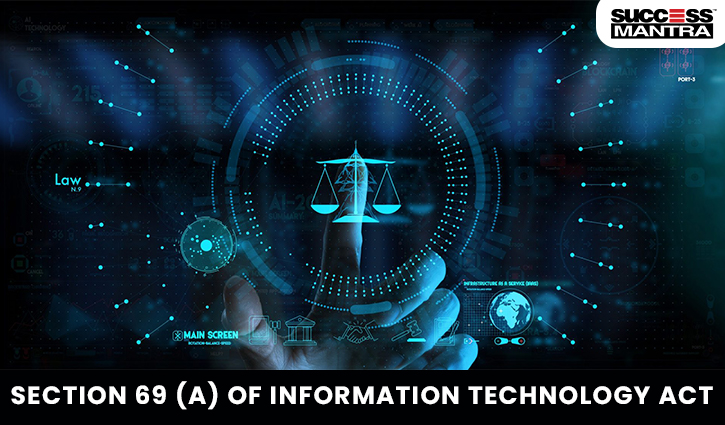
SECTION 69 A OF INFORMATION TECHNOLOGY ACT
SECTION 69 (A) OF INFORMATION TECHNOLOGY ACT
The Ministry of Electronics & Information Technology (MeitY) issued orders under Section 69 (A) of the Information Technology Act, 2000 to take down certain posts from Twitter (Microblogging Site). Twitter has moved to Karnataka High Court, claiming that many of the blocking orders are procedurally and substantively deficient under Section 69 (A) of the Act.

Current Affairs Notes By Success Mantra Coaching Institute GTB Nagar Delhi CLICK HERE
WHAT IS THE CURRENT ISSUE?
The Ministry said under Section 69 (A) of the IT Act, the company has “failed to comply with the directions on multiple occasions”. Twitter submitted a list of over 80 accounts and tweets that it had blocked based on a request from the government in 2021. Twitter claims that the basis on which multiple accounts and posts have been flagged by the Ministry are either “overbroad and arbitrary” or “disproportionate”. According to Twitter, some of the content flagged by the ministry may pertain to official accounts of political parties, blocking which could be violative of the Right to Free Speech.
WHAT IS SECTION 69 (A) OF THE IT ACT?
About: It confers on the Central and State governments the power to issue directions “to intercept, monitor or decrypt any information generated, transmitted, received or stored in any computer resource”. The grounds on which these powers may be exercised are: In the interest of the sovereignty or integrity of India, defence of India, the security of the state. Friendly relations with foreign states. Public order, or for preventing incitement to the commission of any cognizable offence relating to these.
PROCESS OF BLOCKING INTERNET WEBSITES:
Section 69A, for similar reasons and grounds (as stated above), enables the Centre to ask any agency of the government, or any intermediary, to block access to the public of any information generated, transmitted, received or stored or hosted on any computer resource. The term ‘intermediaries’ includes providers of telecom service, network service, Internet service and web hosting, besides search engines, online payment and auction sites, online marketplaces and cyber cafes. Any such request for blocking access must be based on reasons given in writing.

PRAVAHINI Current Affairs Notes By Success Mantra Coaching Institute GTB Nagar Delhi CLICK HERE
WHAT ARE THE OTHER RELATED LAWS?
In India, the Information Technology (IT) Act, 2000, as amended from time to time, governs all activities related to the use of computer resources. It covers all ‘intermediaries’ who play a role in the use of computer resources and electronic records. The role of the intermediaries has been spelt out in separate rules framed for the purpose in 2011- The Information Technology (Intermediaries Guidelines) Rules, 2011.
REASON FOR INTERMEDIARIES TO SHOW COMPLIANCE TO IT ACT?
International Requirement: Most nations have framed laws mandating cooperation by Internet service providers or web hosting service providers and other intermediaries to cooperate with law-and-order authorities in certain circumstances.
To Fight Cybercrime: Cooperation between technology services companies and law enforcement agencies is now deemed a vital part of fighting cybercrime and various other crimes that are committed using computer resources. These cover hacking, digital impersonation and theft of data.
To Prevent Misuse of Internet: The potential of the misuse has led to law enforcement officials constantly seeking to curb the ill-effects of using the medium.
THE IT [INTERMEDIARIES GUIDELINES (AMENDMENT) RULES] 2018

Social media intermediaries should publish rules, privacy policy to stop users from engaging in online material which is paedophilic, pornographic, hateful, racially and ethnically objectionable, invasive of privacy, etc. The online intermediaries should provide information or assistance within 72 hours when asked by any government agency for reasons of State security, cyber security, investigation, detection, prosecution or prevention of offenses. These offenses may include mob violence, lynching, online sexual abuse, etc. The “originator of the information” can be traced to register an FIR. The social media intermediaries should take all reasonable measures to protect individual privacy as required under the Information Technology Rules of 2011. The online intermediaries should appoint in India, a nodal person of contact for 24X7 coordination with law enforcement agencies and ensure compliance with their orders. Online Intermediaries should remove or disable access to unlawful content,within 24 hours, relatable to Article 19(2) of the constitution of India such as in the “interests of the sovereignty and integrity of India, the security of the State, friendly relations with foreign States, public order, decency or morality, or in relation to contempt of court, defamation or incitement to an offense." The intermediary is also expected to preserve such information and associated records for at least 180 days for investigation purposes. The intermediary should deploy technology based automated tools for identifying and removing or disabling public access to unlawful information or contents. The intermediary should report cybersecurity incidents with the Indian Computer Emergency Response Team. On their website, the intermediary should publish the name of the Grievance Officer and his contact details and the mechanism by which users or any victim who suffers can notify their complaints against such usage.













https://odessaforum.biz.ua/
This post is invaluable. Where can I find out more? https://odessaforum.biz.ua/
Reynaldo Lim
To the successmantra.in owner, You always provide useful information.